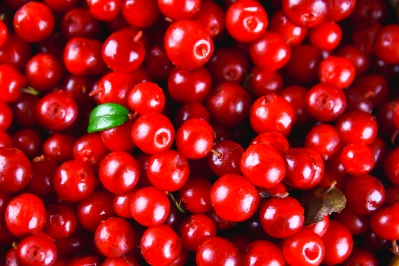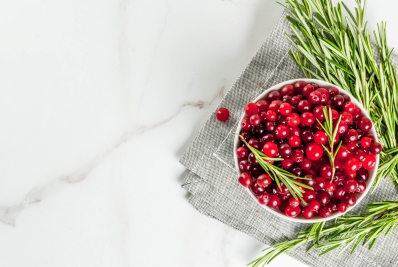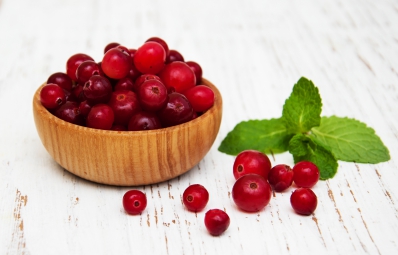Cranberry is a red colored, small, round shaped fruit that belongs to Vaccinium genus. It is rich in antioxidants, polyphenols and micronutrients and serves various important functions in body. Cranberry is also known as the powerhouse of antioxidant (due to its profound antioxidant content). It has been used for centuries to treat urinary tract infection (UTI). Recently cranberries are processed to form sweetened, juice, jam and sauce and their consumption is very beneficial to prevent several diseases.
Nutritional overview of cranberries
- Cranberry contains less amount of carbohydrate and contains dietary fibre
- It is absolutely free from fat and hence provides very less calories
- It also contains too some extent of proteins
- It contains significant amount of calcium, phosphorus, sodium, potassium, magnesium, manganese, copper, zinc and iron
- It also contains several vitamins such as Vitamin A, E, K, C, B1, B2, B3, B6 and folic acid (Vitamin B9)
- It is rich in phytonutrients which have strong anti-inflammatory, antioxidant and anticarcinogenic effects. These phytonutrient contents of cranberry make it unique and healthier which include anthocyanins, flavonols, hydroxycinnamic acids, hydroxybenzoic acids, terpenoids, stilbenoids and proanthocyanidins
Therapeutic applications
Cranberry and urinary tract infection
- Urinary tract infection (UTI) is considered as very common type of infection (second most) throughout the world mainly caused by Escherichia coli and females are more prone to develop this infection
- UTI generally increases the morbidity rate among individual (especially females) by enhancing recurrence rate and antibiotic resistance
- It has seen that cranberry plays an important role in treating UTI. Flavanols, terpenes, phenolic acids, anthocyanins and proanthocyanidins (PACs) contents of cranberry are responsible for treating UTI
- Among all polyphenolic compounds of cranberry, PAC (especially PAC type A) plays more significant role in preventing UTI as it helps to inhibit the adhesion of bacteria (E.coli) to the epithelial cells of the urinary tract
- So, it is beneficial to consume cranberry or its extract to prevent the recurrent UTI and to improve its symptoms as it inhibits the sticking of bacteria to the urinary bladder wall

Cranberry and CKD
- Recently chronic kidney disease (CKD) becomes very common among people and generally recognized as a severe health problem worldwide. Basically, prolong diabetes, prolong hypertension and inadequate intake of balance diet are the principle causative factors of CKD
- CKD develops several complications within body like oedema, waste accumulation within blood, cellular senescence, constipation, malnutrition, cardiac injuries, gut dysbiosis, inflammation and increases oxidative stress of the body, which ultimately decrease life expectancy. Recent research have shown that nutrition has a vital role on preventing CKD related morbidity and mortality rate. Especially consumption of cranberries or its extract or its supplements have significant effect on lowering the consequences of CKD (de Almeida Alvarenga et al., 2019)
- The anti-inflammatory, antioxidant properties of cranberries and its ability to modulate gut microbiota are responsible to decrease the progression of CKD as inflammation, oxidative stress, improper gut barrier permeability and imbalance in gut microflora are recognized as critical factors for CKD progression

Cranberry and Cancer
- The phytonutrient contents of cranberries like flavonols, phytochemicals, A-type proanthocyandins, proanthocyanidins (PACs) and anthocyanins act as strong chemopreventive agents
- Recent research has shown that these phytonutrients of cranberry help to suppress malignant cell growth by inducing apoptosis, reducing the activity of ornithine decarboxylase (an enzyme) and reducing the expression of cancer cells, matrix metalloproteinase (Prasain et al., 2019)
- Another important anticancer effect of cranberry lied on the modulation of reactive oxygen species (ROS)
- Recently, cranberry extract concentrates are widely used as an effective therapeutic measure to treat carcinoma

Cranberry and dental carries
- It has seen that polyphenolic compounds of cranberry help to prevent various carcinogenic virulence activities (as it has virulence lowering effects) which are accountable for the pathogenesis of dental carries
- Various researches have shown that especially the A-type proanthocyandin component of cranberry shows significant effects on preventing dental disorders (especially dental carries) by preventing host inflammatory responses, decreasing the activity of periopathogenic proteolytic enzymes and suppressing the formation of bacterial biofilm (Philip and Walsh, 2019)
- So, consumption of cranberry has great therapeutic advantages that help to promote oral health

Health benefits
Role on cardiovascular health
- The antioxidant and polyphenol components of cranberry help to reduce the prevalence of cardiac morbidity and mortality
- It is associated with decreasing LDL concentration that reduces the prevalence of atherosclerosis
- It also promotes cardiac health by reducing hypertension and Platelet aggregation
Role on oral health
- It helps to reduce accumulation of harmful acid in mouth and inhibits the sticking of acid to teeth, which helps to prevent various gum diseases
- The polyphenol components of cranberry help to inhibit the colonization of oral streptococci on dental surface and inhibit carcinogenic dental plaque formation
Role on gastrointestinal health
- Fibre contents of cranberry help to promote bowel health and make defecation easy (by enhancing stool mass and increasing water retention which makes the stool softer) hence help to prevent constipation
- It helps to improve the beneficial microbial load within gut and promotes colonic health
- It helps to reduce excess secretion of bile acid, which is associated with reducing the risk of developing gastrointestinal and colon cancers
Role on regulating blood sugar concentration

- Zinc content of cranberry plays significant role in reducing blood sugar level, as it acts as an important integral part of insulin. So, consumption of cranberry helps to improve the functionality of insulin
- The manganese component of cranberry also shows blood sugar controlling activity
- On the other hand, cranberry is considered as a low sugar fruit hence its consumption does not enhance glycemic load, so it is completely safe to include in the diet of a diabetic patient
Role on preventing obesity
- The fibre content of cranberry is responsible for preventing weight gaining as it reduces food intake by regulating appetite (provides a felling of stomach fullness)
- It also provides very few calories so it can be easily included in the diet of obese individual
- Another important feature of the fibre content of cranberry is focused on its ability of increasing HDL level, which helps to reduce LDL concentration in blood (by transporting the cholesterol into liver) and hence decreases visceral fat accumulation
Role on skin
- It has seen that the vitamin C content of cranberry is responsible for synthesizing collagen that helps to improve the elasticity of the skin
- Proper synthesis of collagen is related with carrying sufficient oxygen and nutrients which make the skin softer, firm and glowing
Role on nervous system

- It has seen that after a stroke (blocking of blood flow in brain), brain cell death occurred. This can be prevented by consuming cranberry as it helps to reduce the brain cells damage and helps to restore them
- It is also associated with preventing oxidative damages of brain and promotes brain function
Risk factors
- Excessive consumption of cranberry is not wise as it develops nausea, diarrhea, stomach cramp, gastritis and gastrointestinal irritabilities
- Cranberry in high dose can develops kidney stone
- It is better to avoid cranberry if warfarin is taken
- Pregnant women or lactating women should consult with doctors or nutritionist before consuming cranberry

Source:
Caldas, A.P.S., Coelho, O.G.L. and Bressan, J., 2018. Cranberry antioxidant power on oxidative stress, inflammation and mitochondrial damage. International Journal of Food Properties, 21(1), pp.582-592.
de Almeida Alvarenga, L., Borges, N.A., Moreira, L.D.S.G., Teixeira, K.T.R., Carraro-Eduardo, J.C., Dai, L., Stenvinkel, P., Lindholm, B. and Mafra, D., 2019. Cranberries–Potential benefits in patients with chronic kidney disease. Food & function, 10(6), pp.3103-3112.
Fu, Z., Liska, D., Talan, D. and Chung, M., 2017. An Updated Meta‐Analysis of Cranberry and Recurrent Urinary Tract Infections in Women. The FASEB Journal, 31, pp.lb343-lb343.
Loyer, J., 2017. The cranberry as food, health food, and superfood: challenging or maintaining hegemonic nutrition?.
Philip, N. and Walsh, L.J., 2019. Cranberry polyphenols: Natural weapons against dental caries. Dentistry journal, 7(1), p.20.
Prasain, J.K., Grubbs, C. and Barnes, S., 2019. Cranberry anti-cancer compounds and their uptake and metabolism: An updated review. Journal of Berry Research, (Preprint), pp.1-10.
Weh, K.M., Clarke, J. and Kresty, L.A., 2016. Cranberries and cancer: An update of preclinical studies evaluating the cancer inhibitory potential of cranberry and cranberry derived constituents. Antioxidants, 5(3), p.27.
Zhao, S., Liu, H. and Gu, L., 2018. American cranberries and health benefits–an evolving story of 25 years. Journal of the Science of Food and Agriculture.


